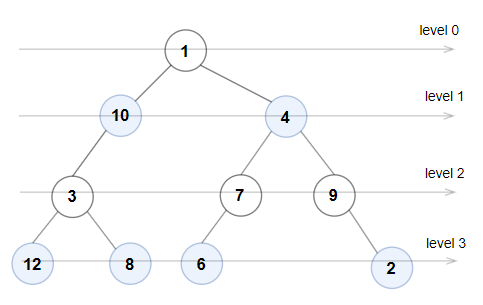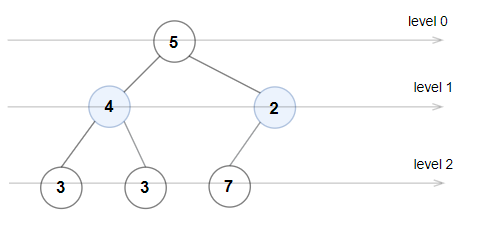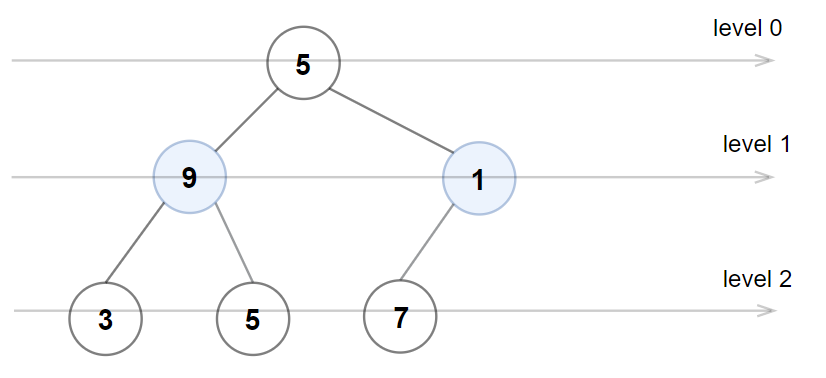LeetCode in Kotlin
1609. Even Odd Tree
Medium
A binary tree is named Even-Odd if it meets the following conditions:
- The root of the binary tree is at level index
0, its children are at level index1, their children are at level index2, etc. - For every even-indexed level, all nodes at the level have odd integer values in strictly increasing order (from left to right).
- For every odd-indexed level, all nodes at the level have even integer values in strictly decreasing order (from left to right).
Given the root of a binary tree, return true if the binary tree is Even-Odd, otherwise return false.
Example 1:

Input: root = [1,10,4,3,null,7,9,12,8,6,null,null,2]
Output: true
Explanation: The node values on each level are:
Level 0: [1]
Level 1: [10,4]
Level 2: [3,7,9]
Level 3: [12,8,6,2]
Since levels 0 and 2 are all odd and increasing and levels 1 and 3 are all even and decreasing, the tree is Even-Odd.
Example 2:

Input: root = [5,4,2,3,3,7]
Output: false
Explanation: The node values on each level are:
Level 0: [5]
Level 1: [4,2]
Level 2: [3,3,7]
Node values in level 2 must be in strictly increasing order, so the tree is not Even-Odd.
Example 3:

Input: root = [5,9,1,3,5,7]
Output: false
Explanation: Node values in the level 1 should be even integers.
Constraints:
- The number of nodes in the tree is in the range
[1, 105]. 1 <= Node.val <= 106
Solution
import com_github_leetcode.TreeNode
/*
* Example:
* var ti = TreeNode(5)
* var v = ti.`val`
* Definition for a binary tree node.
* class TreeNode(var `val`: Int) {
* var left: TreeNode? = null
* var right: TreeNode? = null
* }
*/
class Solution {
private val comp: MutableList<Int> = ArrayList()
fun isEvenOddTree(root: TreeNode?): Boolean {
return find(root, 0)
}
private fun find(root: TreeNode?, height: Int): Boolean {
if (root == null) {
return true
}
if (height % 2 == 0 && root.`val` % 2 == 0 || height % 2 == 1 && root.`val` % 2 == 1) {
return false
}
if (comp.size == height) {
comp.add(root.`val`)
} else {
if (height % 2 == 0) {
if (comp[height] >= root.`val`) {
return false
} else {
comp[height] = root.`val`
}
} else {
if (comp[height] <= root.`val`) {
return false
} else {
comp[height] = root.`val`
}
}
}
return find(root.left, height + 1) && find(root.right, height + 1)
}
}

